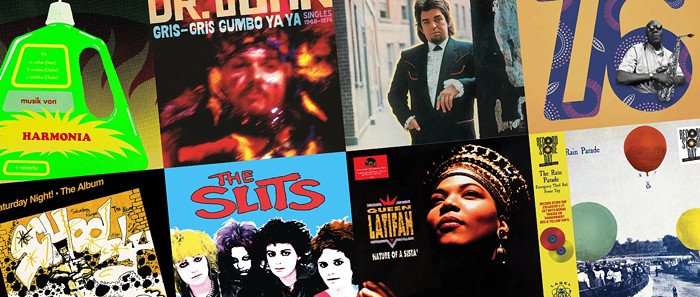In UGK's early days, in the small Eastern Texas town of Port Arthur in the late '80s, a time when Southern rap was still largely disregarded, the Underground Kingz could not have been more aptly named. Today, Bun B and Pimp C stand as undisputed royalty to the modern generation of Southern rappers, one of the most quietly influential forces behind the recent ascendancy of coke rap and the South. But their route from local hustlers to legendary veterans was a slow-going, never-bending grind through two decades of hiphop. Though their emergence was pretty much contemporary with N.W.A.'s, it would take the similarly self-realized, singular, and unremittingly raw UGK many more years to achieve international esteem. Their path was buoyed along the way by moments like their guest verse on Jay-Z's behemoth "Big Pimpin'," but ultimately it would take the commercial breakthrough of their Southern disciples (Mike Jones, Chamillionaire, et al.) to solidify UGK's stature.
Unlike today's cred-flaunting hardcore rap stars, the legitimacy and volume of UGK's personal criminal activities were never as important as the eloquence and honesty they instilled in their work. They were artists, after all, some of the greatest-ever purveyors of hiphop as folk music; over the years their content remained a tight-focused account of the good and ills of their lifestyles, their peers, and their neighborhoods, while the form of their output continued to progress. Pimp C's production, both men's lyricism, as well as the other musical elements they integrated into the ever-self-definitive UGK sound, moved prodigiously with the times, while never overstepping the core aesthetic or hard-bitten quality control of the group.
Their last offering, 2007's self-titled double album, yielded both the group's first number-one chart placement (practically unheard of for such a veteran group) and the stunning single "Int'l Players Anthem (I Choose You)" with OutKast, undeniably the best thing to pierce the ever-darkening sky of rap radio last year. The triumphant tenor of Underground Kingz was heightened by its circumstances—it was the first album the duo had made in six years, reuniting after Pimp's three-year bid for failing to complete a community-service requirement stemming from an aggravated-assault charge and following a string of frustrating label delays. It seemed as though, finally, the times had caught up and the stars had aligned for the Kingz's coronation. And then, on December 4 of last year, Pimp C was found suddenly and somewhat mysteriously deceased in a hotel room in Los Angeles.
The energy and immense goodwill that the group had been building since the early '90s, which seemed to crystallize with the commercially successful, critically adored, guest-laden Underground Kingz, then fell on the broad shoulders of UGK's living half, Bun B. Fortunately, Bun had, to some degree, been here before. When Pimp went to the pokey in 2002, Bun immediately sprung into a fervent hustle to keep UGK culturally alive and kicking, putting in a ton of guest verses on various albums and mixtapes (with the omnipresent rallying cries of "Free Pimp C!" and "UGK for life!"), and assembling the great, collaboration-heavy album Trill as a sort of stopgap until the proper return of the Kingz. The public—and UGK's hiphop progeny (their influence can be felt acutely in everyone from OutKast to Young Jeezy)—responded resoundingly, making "Free Pimp C" a movement as prevalent as, if somewhat more benevolent than, "Stop Snitchin'." Unlike, say, "Free Mumia," "Free Pimp C" was never an actual cry for the rapper's absolution or even a questioning of his prosecutors' motives—Pimp bluntly acknowledged his crime and stoically accepted his sentence. Rather, the purpose of the "Free Pimp C" movement was, for Bun, a necessary and heartfelt extolling of the validity of UGK's legacy.
Now that Pimp's absence is permanent and there will be no early parole for good behavior, Bun has spoken of his resolve to carry UGK into the future as even stronger and more urgent. In addition to a final UGK record (which was begun prior to Pimp's death), Bun is coming this spring with II Trill, his first offering since his partner's sudden death. He explains the title of the new record thusly: that as an artist and a man he is simply too trill (a hybrid of "true" and "real" for you Southern-rap neophytes) to allow his grief to swallow him, too trill to let fall the massive weight of UGK's legacy, too trill to ever stop his persevering journey in the rap game.
This resolution was evident in his recent first public performance since Pimp's passing. At Houston's Warehouse Live, Bun took the stage bursting with bombastic, proselytizing love for the memory of his partner, the sort of manic giddiness born only from times of overwhelming emotion. The set reached a cathartic zenith with its penultimate song, "One Day," the mournful opener to UGK's greatest record, 1996's Ridin' Dirty. The cut's ghostly soul refrain, "One day you're here, baby/But then you're gone" couldn't have spoken more plainly to the sudden, strange loss of Pimp C (initially unexplained, the death was later linked to a combination of recreational cough- syrup use and preexisting sleep apnea). The song's performance found Bun wracked, falling to his knees, and embracing Pimp's mother for the duration of the song. Not willing to end the show on a funereal tone, however, Bun rallied his composure to deliver the Grammy-nominated "Int'l Players Anthem" on his own, pointing the future of UGK not to the graveyard, but to the stars. ![]()


















